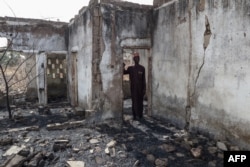The anniversary of Boko Haram's infamous attack comes after two large-scale kidnappings—one in the same northeastern state as Chibok, the other in northwestern Kaduna state, where over 130 children were seized from their school.
As the country grapples with security challenges on several fronts, hostage-taking has spiraled into a nationwide industry and become a favored tactic of bandit gangs and jihadists.
What's the background?
In the early 2000s, kidnappers targeted oil workers in the Niger Delta, but the problem escalated following a 2009 jihadist insurgency in the northeast.
The kidnapping of 276 schoolgirls from the town of Chibok on April 14, 2014 made headlines around the world. Almost 100 of the captives remain missing.
Boko Haram and rival group Islamic State West Africa Province (ISWAP) still regularly carry out abductions.
But with the rise of heavily armed gangs of criminals known as bandits, the northwest has become the region most affected by kidnappings.
The gangs have targeted schools and colleges in the past, but there had been a recent lull in such attacks before the mass abduction in Kaduna state.
Kidnap gangs also operate nationwide, going after everyone from schoolchildren to the families of traditional monarchs.
Some experts believe the country's economic crisis is driving an increase in kidnappings as desperate Nigerians turn to crime for income.
"It's all about lack of money and poverty," said Emeka Okoro, an analyst with the Nigerian risk consultancy SBM Intelligence.
"Kidnapping is lucrative—huge amounts of money have been paid in the past to rescue schoolchildren."
How big is the problem?
Data on kidnapping is unreliable because of under-reporting and daily abductions in Nigeria rarely gain global attention.
SBM said it had recorded 4,777 people abducted since President Bola Ahmed Tinubu took office in May last year.
More than 1,680 pupils were kidnapped in Nigerian schools from early 2014 to the end of 2022, according to the charity Save the Children.
What have the authorities done?
In 2022, a law was introduced that banned handing money to kidnappers and officials deny paying ransoms to secure the release of victims.
Many families say they have little faith in the authorities and feel they have no choice, often pooling their savings to meet kidnappers' demands.The authorities have used methods like registering mobile phone SIM cards to help track kidnappers.
Police have deployed anti-kidnap units, but the forests where gangs hide are difficult to access and control.
In the northwest, authorities have tried to negotiate with bandits, strike amnesty deals and deploy vigilante groups.
But they have had little success and critics say the kidnapping crisis is out of control.













Forum